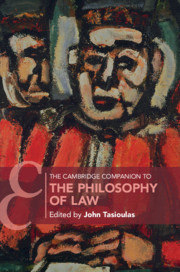Book contents
- The Cambridge Companion to the Philosophy of Law
- Cambridge Companions to Law
- The Cambridge Companion to the Philosophy of Law
- Copyright page
- Dedication
- Contents
- Contributors
- Introduction
- Part I General Theory
- Part II Values
- 6 The Rule of Law
- 7 Justice without Ethics: A Twentieth-Century Innovation?
- 8 Rights and Human Rights
- 9 Equality and Discrimination
- 10 Authority and Legitimacy
- 11 The Ends and Limits of Law
- Part III Special Theory
- Index
10 - Authority and Legitimacy
from Part II - Values
Published online by Cambridge University Press: 15 June 2020
- The Cambridge Companion to the Philosophy of Law
- Cambridge Companions to Law
- The Cambridge Companion to the Philosophy of Law
- Copyright page
- Dedication
- Contents
- Contributors
- Introduction
- Part I General Theory
- Part II Values
- 6 The Rule of Law
- 7 Justice without Ethics: A Twentieth-Century Innovation?
- 8 Rights and Human Rights
- 9 Equality and Discrimination
- 10 Authority and Legitimacy
- 11 The Ends and Limits of Law
- Part III Special Theory
- Index
Summary
Consider two ways in which the existence of political authorities is morally problematic. Do not think only about tyrannical or unjust authorities, for example, states that persecute minorities, unjustly expropriate property or wage unnecessary wars. These authorities are morally problematic in a number of obvious ways that will not be discussed here. Think about good political authorities: the peaceful ones that protect human rights, respect minorities and enact reasonable distributive policies. To begin with, all political authorities, good and bad ones, regularly interfere with our liberty, using coercion to prevent us from acting in certain ways and ensure that we act in others. This is obviously problematic since we value our liberty and we normally think that it can be constrained only when we exercise it in ways that are morally wrongful. But political authorities do not stop at that. In addition to using coercion, they also claim the right to impose obligations on us. Thus, they interfere not only with our liberty, but also with our autonomy, that is, with our capacity to decide for ourselves how best to respond to the reasons for action that we have. We might think that this second form of interference is even more worrisome, because it constrains not only our freedom to act in accordance with what we think is right, but our very capacity to determine for ourselves how to act by exercising our autonomy. And is this not one of the capacities we should cherish the most, and be more reluctant to abdicate?
- Type
- Chapter
- Information
- The Cambridge Companion to the Philosophy of Law , pp. 191 - 207Publisher: Cambridge University PressPrint publication year: 2020
- 1
- Cited by

